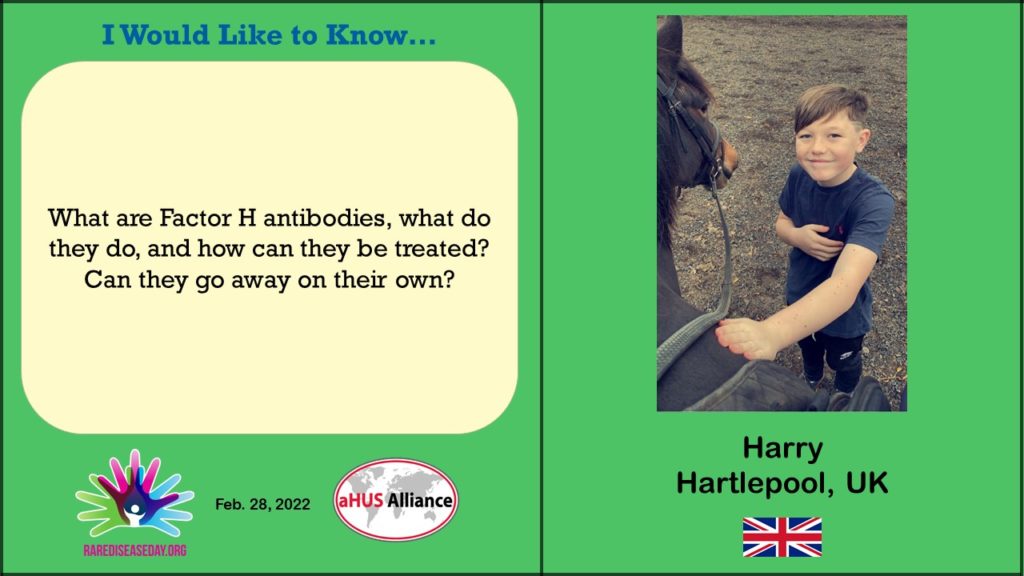Another question from the RDD2022 video. This one from Harry in Hartlepool UK. This one is about anti factor h autoantibodies.
It is not known how many cases of aHUS are the result of anti factor h autoantibodies (AFHA) , It used to be thought that it was around 6% of aHUS cases, but higher percentages have been found in more recent genetic studies. In countries like India it is likely to be even more common, as high as 50% of all aHUS ptients.
All of us create antibodies in our immune system. When we received COVID vaccinations it stimulated the creation of antibodies. Good things to have to fight diseases like COVID.
But sometimes the immune system creates antibodies which erroneously attack our body’s own cells. These are called autoantibodies. They cause autoimmune diseases. Each disease is dependent on what part of the body is affected. There are over 80 types of autoimmune diseases including Lupus, Rheumatoid Arthritis and Psoriasis among the best known.
No one really knows why the immune system does this. It is not rare, there are nearly 25 million autoimmune disease suffers in the USA and most of them are women (80%). Some say there could be hormonal links.

The immune system can create an antibody that can attach to and compromise perfectly good Complement Factor H (CFH) in a person’s Complement system,Harry. It is quite a common for these autoantibodies to be found in the general population too but not everyone gets aHUS. There are also autoantibodies to Complement Factor I but these have not been found to affect Factor I function.
But anti factor H autoantibodies (AFHA) do hamper CFH from doing its job. That job is to control the Complement from over activating and attacking its own body. If Complement cannot be controlled, aHUS can result. And AFHA is the cause, Harry.
It is an acquired autoimmune disease that causes a TMA by hampering Complement and so it is also a Complement disease. It overlaps. aHUS is not an autoimmune disease. But AFHA TMA is.
It is mainly found as a cause of childhood aHUS , usually in 9 to 13 year old children, but it can manifest in adults too. It is rare and maybe no more than 1 in 20 million people will experience it in any one year.
It is thought that some defects in other parts of the Complement system, which are known Complement Factor H Related Proteins (CFHRP), may also play a role in creating AFHA aHUS.
AFHA aHUS can be controlled by using eculizumab. But the autoantibodies can also be eliminated, or reduced, to a safe level with treatment. Immunosuppressants can usually help do that. Rituximab is frequently used for that purpose in autoimmune diseases including AFHA. Once the level of AFHA fall to 1200 AU/ ml ( doctors speak for measuring stuff like autoantibodies in the blood) or less, an uninterrupted remission from aHUS can follow. Once in remission eculizumab can be stopped but AFHA levels should be monitored in case they may increase to unsafe levels again.
They can even spontaneously disappear Harry. But it is very rare that they do.
A previous article about AFHA.
Anti-FHs aHUS – a Disease within a Disease
The aHUS Patient community is becoming familiar with the fact that an incident of aHUS is a chance event which requires the coming together of an individual’s rare genetic predisposition…CONTINUE READING
Article No. 497


Thank you so so much! We are still learning so much about this and I worry so much about harry, he’s doing so well on reviluzimab at the minute, but they do not want to give him any other oral medication as they in Newcastle Rvi say it’s better of not to because of long term effects, if these antibodies stay nice and low will this stop ahus coming back and effecting his kidneys?
Thank you Jamielee. Glad to hear Harry is doing so well. Yes ravulizumab will stop any aHUS recurring if the titre, as they call it, of antibodies is still too high that without complement inhibition he would still be susceptible to aHUS. In India, where children have no access to eculizimab or ravulizumab , the doctors there aim to get the titre down to safe levels as soon as they possibly can and the children are not likely to re onset.